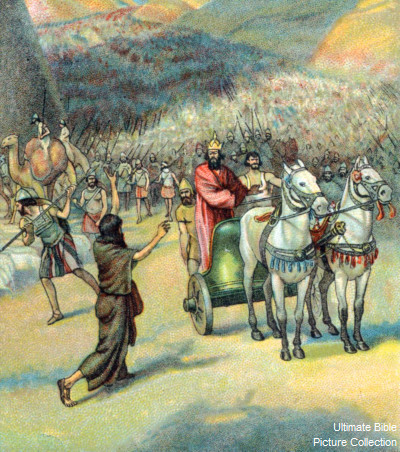 Following Rehoboam’s death, his son Abijah occupies the throne of Judah until 911 BC. Abijah did not seek after God, but his son Asa would. Asa became king in 911 BC and remained in command until 870 BC. Chapters 14 and 15 of 2 Chronicles describe Asa’s reign.
Following Rehoboam’s death, his son Abijah occupies the throne of Judah until 911 BC. Abijah did not seek after God, but his son Asa would. Asa became king in 911 BC and remained in command until 870 BC. Chapters 14 and 15 of 2 Chronicles describe Asa’s reign.
Verses 1-8 of chapter 14 record Asa’s deeds during the first decade of his reign. Asa collects idols and destroys them. He also dismantles pagan worship centers and altars all over Judah. Because he obeys God, Asa is rewarded with a prolonged period of peace.
The peace enables Asa to mount a construction campaign where he fortifies the cities of Judah to protect against foreign attack. He also trains and equips a large army consisting of hundreds of thousands of soldiers.
Again, Asa clearly attributes the peace to his obedience toward God. He explains to Judah, “The land is still ours, because we have sought the LORD our God; we sought him and he has given us rest on every side.”
In fact, there are nine mentions of Asa seeking the Lord in chapters 14-16 of 2 Chronicles. The clear implication is that seeking the Lord (obeying His commands) leads to prosperity for Asa and for any other person who does likewise. Obviously, this principle is not to be carried too far. Even in Asa’s life, there are problems and we know that godly people in the Bible faced hardship, but the general principle still holds. Those who seek after God will generally experience greater prosperity than those who don’t.
At the end of ten years, a massive army threatens Judah, led by a man known as Zerah the Cushite. Most scholars believe that Zerah is a general under the command of the Egyptian Pharaoh, Orsokon, but there are others who argue that Zerah is operating on his own and has nothing to do with Egypt.
In any case, Zerah’s army advances all the way through Judah until they are a mere 25 miles southwest of Jerusalem, at a place called Mareshah. Instead of first leading an assault on Zerah, Asa prays to God for His favor in the upcoming battle, just as his ancestors David and Solomon prayed.
“LORD, there is no one like you to help the powerless against the mighty. Help us, O LORD our God, for we rely on you, and in your name we have come against this vast army. O LORD, you are our God; do not let man prevail against you.”
God indeed answers Asa’s prayer and causes the Cushites to flee. Asa chases them 20 miles further southwest and gathers plunder, including large numbers of livestock, from the land the Cushites previously occupied.
After Asa and his army return to Jerusalem, the capital of Judah, a prophet called Azariah meets with Asa and delivers a brief, but powerful prophecy. The most important words of the prophecy proclaim, “The LORD is with you when you are with him. If you seek him, he will be found by you, but if you forsake him, he will forsake you.”
Azariah reminds Asa of the period of the Judges, where the people of Israel did not seek the Lord. It was a time of great turmoil and distress, with never-ending wars. Azariah promises Asa that if he will continue his religious reforms, God will reward Asa and the kingdom of Judah.
Asa is encouraged by the prophet and continues his reforms. He gathers the livestock plundered in the battle against Zerah and prepares a covenant renewal ceremony during the Pentecost feast in the 15th year of his reign. The author of Chronicles notes that Israelites from the tribes of Ephraim, Manasseh and Simeon had emigrated to Judah because of Asa’s obedience to God. They too participate in the covenant renewal
J. A. Thompson, in The New American Commentary Volume 9 – 1, 2 Chronicles, writes:
The Davidic kings showed an inclusive concern for the whole of Israel. This appears repeatedly from 1 Chr 13:1–5 onward. A special point is made of the inclusion of people from the north (cf. 11:13–17). These northerners came in large numbers from Israel to Jerusalem when they saw that Asa’s God was with him.
The author of Chronicles describes the covenant ceremony:
At that time they sacrificed to the LORD seven hundred head of cattle and seven thousand sheep and goats from the plunder they had brought back. They entered into a covenant to seek the LORD, the God of their fathers, with all their heart and soul. . .. They took an oath to the LORD with loud acclamation, with shouting and with trumpets and horns.
Asa was so zealous for the Lord that he went as far as removing his own grandmother from her office as queen mother because she was worshipping Asherah, the pagan mistress of God. Asa destroyed the pole she was using in her worship, and burned it in the valley that divides Jerusalem and the Mount of Olives. Because of Asa’s action, he was rewarded with relative peace for most of his reign.